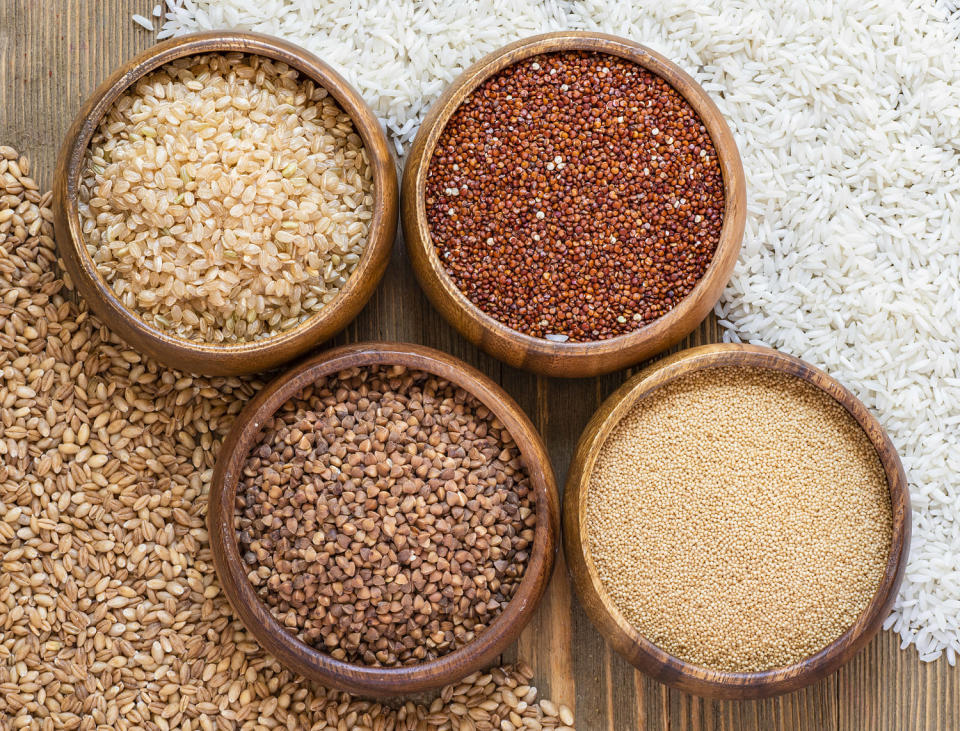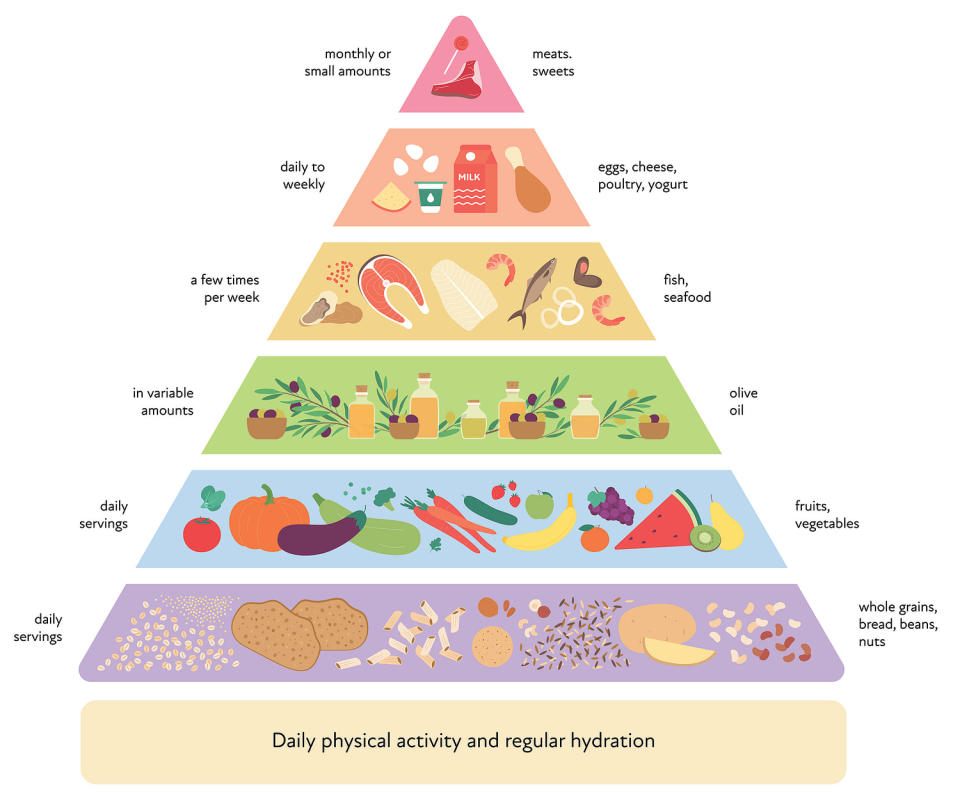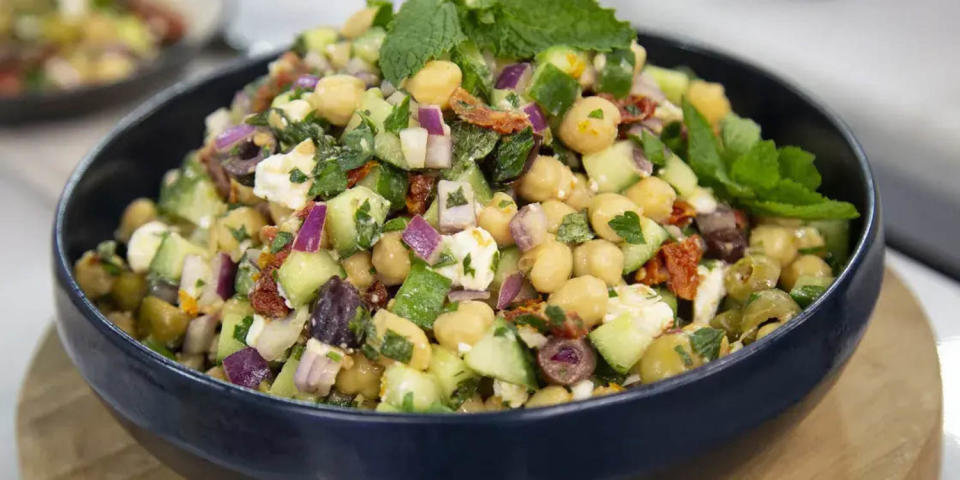What is the Mediterranean diet? A top-rated diet for a healthy heart, brain and more

The Mediterranean diet is a nutritious and delicious meal plan that can help take the guesswork out of healthy eating.
There's a good reason the meal plan consistently ranks at the top of overall best diets in U.S. News & World Reports' annual list: It's an inclusive eating pattern chock full of healthy and satisfying foods, not a restrictive plan.
The Mediterranean diet, which is rich in lean protein, whole grains and fresh produce, has major benefits for weight loss as well as brain and heart health, research shows. A new study published in JAMA Network Open found that women who followed the Mediterranean diet had a lower risk for death over 25 years.
Dietitians also love the Mediterranean diet because it's full of affordable, accessible foods that are tasty and versatile — including many that you probably already love to eat. In other words, eating the Mediterranean diet boosts your health and it feels like a pleasure, rather than a chore.

What is the Mediterranean diet?
The Mediterranean diet includes foods that are native to the countries bordering the Mediterranean sea — namely Greece, Italy, Spain, Morocco, Egypt and Lebanon.
The diet plan prioritizes foods like vegetables, fruits, whole grains and legumes while reducing sugar, sodium, highly processed foods, refined carbs, saturated fats and fatty or processed meats. Basically, the Mediterranean diet is effective because it naturally includes nutrient-dense plant-based foods and excludes unhealthy additives. These foods also tend be high in lean and plant-based protein as well as heart-healthy fats.
The Mediterranean diet is both flexible and accessible, making it an easy way to eat a healthy diet. It’s so good for you, in fact, that in 1993 the nonprofit group Oldways partnered with the Harvard School of Public Health and the World Health Organization (WHO) to create the Mediterranean Diet Pyramid as a healthier alternative to the USDA food pyramid.
And foods featured in the Mediterranean diet are a pleasure to eat. “It celebrates the enjoyment of food,” Samantha Cassetty, a registered dietitian and weight-loss expert based in New York City and the coauthor of “Sugar Shock,” told TODAY.

Potential health benefits of the Mediterranean diet
The Mediterranean diet was developed because people who live in countries bordering the Mediterranean Sea tend to have lower levels of heart disease and live longer than Americans. Experts believe that may be due, at least in part, to their healthy diet.
Researchers became interested in Mediterranean-style eating in the 1950s. And it was introduced as a diet by the USDA in 1992 as a way to help Americans reduce their cholesterol.
In addition to the general nutritional benefits that come with eating Mediterranean diet foods, the diet can be especially helpful for specific segments of the population.
For instance, recent research suggests that pregnant women can lower their risk of developing high blood pressure by eating a Mediterranean diet. Another study shows that people at risk for metabolic disease could reduce their blood cholesterol and boost their digestive health by following a Mediterranean diet.
Plus, the Mediterranean diet has proven to be quite effective for people who want to manage — or lose — weight. In one study, researchers analyzed the diets of more than 32,000 Italians over the course of 12 years. Their results suggested the Mediterranean diet could help limit weight gain and increases in waist circumference.
In case that isn't enough to convince you, the "green" Mediterranean diet — which excludes red meat — has been shown to be extremely effective at reducing visceral fat. Visceral fat is dangerous for our health because it surrounds and can even damage your organs.
But you don’t have to have a health issue to adopt the Mediterranean diet. “It’s a healthy diet for just about everyone,” Karen Ansel, a New York-based registered dietitian and author of “Healing Superfoods for Anti-Aging, told TODAY. Experts agree that it can be among the best ways to lose weight. And it can work if you want to improve your overall health, even if you’re comfortable with your weight.
The Mediterranean diet may reduce the signs of Alzheimer's
The Mediterranean diet can play a major role in brain health, according to findings from new research.
The study analyzed the postmortem autopsy results of 581 people. What researchers found was that seniors who had followed one of two diet plans — the Mediterranean diet and the MIND diet — showed less brain "plaques" than those who did not.
These brain "plaques" are toxic buildups of abnormal proteins that are thought to play a major role in Alzheimer's disease. Drugs that slow the progression of these buildups are notoriously expensive.
The findings of the study don't prove unequivocally that making simple dietary changes — like adopting the Mediterranean diet — can by itself prevent Alzheimer's, but they do support past research that suggests that healthy diets can make an important impact on brain health.
Foods to eat on the Mediterranean diet
Keep in mind that the Mediterranean diet represents a culture just as much as it does a cuisine, so it’s not about what’s allowed or avoided.
Before it was a “diet,” this was just the way that people who live near the Mediterranean ate. They relied on seasonal foods and needed to mind their budgets and their family’s health at the same time. So it’s okay for you to follow their lead and include as many or few Mediterranean foods as you can.

These foods are central foods in the Mediterranean diet:
Fish — especially salmon, sardines, and tuna
Fresh produce — use what’s locally grown to ensure freshness
Healthy fats — like nuts, avocado and olive oil
Lean dairy — like cheese, Greek yogurt and milk
Whole grains — try cereals, brown rice and whole-wheat pasta or ancient grains like quinoa, chia, amaranth, bulgar and buckwheat
Wine — in moderation
The Mediterranean diet food pyramid
The Mediterranean food pyramid offers a great way to understand how to think about your food instead of giving you rigid instructions.
The pyramid is organized by how often you should include a food category in your diet, with the foods you should include most often at the base and the foods you should include less often at the top.

Here’s the Mediterranean food pyramid, from base to top:
Fruits, vegetables, grains (mostly whole), olive oil, beans, nuts, legumes & seeds, herbs & spices: Consume these at every meal.
Fish and seafood: Eat at least twice a week.
Poultry, eggs, cheese, and yogurt: Eat in moderate amounts, daily to weekly, depending on the food.
Meats and sweets: Eat these only occasionally.
Foods to avoid on the Mediterranean diet

There are no totally forbidden foods on the Mediterranean diet. But you generally want to stick to eating foods with recognizable non-scientific names. A general rule-of-thumb is that most of the things you eat should not come in boxes.
Avoid these foods on the Mediterranean diet:
Alcohol (besides wine)
Butter
Heavily processed food including frozen meals with added sodium, soda, high-sugar beverages, candy and processed cheese
Processed red meats, such as hot dogs, sausage, bacon and lunch meats
Refined grains, like white bread, white pasta or anything with white flour
Refined or processed oils, such as soybean oil, safflower oil, corn oil, vegetable oil, canola oil and any hydrogenated or partially-hydrogenated oils
Mediterranean diet recipes
It's easy to eat according to Mediterranean diet principles. With a plethora of versatile ingredients to choose from, you can mix and match your favorite foods to keep your meals filling and interesting.
Opt for recipes that feature plants, lean protein, healthy fats and whole grains. Here are few to get you started:
Eggplant with Tomato, Broccolini and Mozzarella by Yasmin Fahr
Sheet-Pan Greek Shrimp with Asparagus, Tomatoes and Olives by Casey Barber
One-Pot Mediterranean Chicken by Camila Alves
Grilled Mediterranean Chicken by Rui Correia
Proven?al Aubergine and Dorade Pressed Sandwich by Stephanie Harris-Uyidi
Mediterranean Chickpea Salad by Evette Rios
Avocado Tomato Tabbouleh by Kevin Curry
Mediterranean Hummus Board Recipe by Joy Bauer
Pasta Fagioli by Stanley Tucci
Italian Fish and Veggie Packets by Giada De Laurentiis
Air Fryer Meatballs with Tzatziki Sauce by Kevin Curry
This article was originally published on TODAY.com